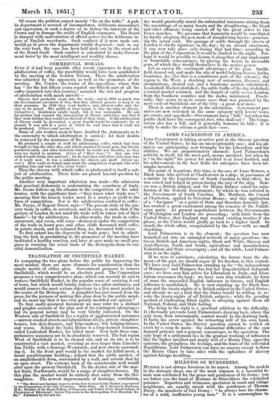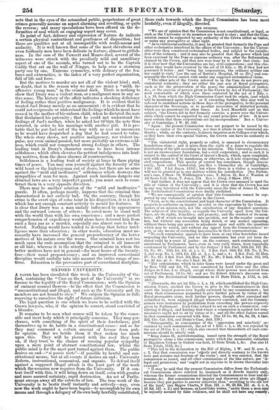MILDNESS OF MURDERERS.
MURDER is not always ferocious in its aspect. Among the models in the statuary shops, one of the moat common is a beautiful fe- male arm celebrated for the grace and gentleness of its forms : you see before you the hand of Madame de Brinvilliers the celebrated poisoner. Reporters and witnesses, spectators in court and village neighbours, are equally struck with the gentleness of Thomas Drory, the murderer of Sael Denny : " he always bore the charao- ter of a mild, inoffensive young man." It is a commonplace to
note that in the eyes of the astonished public, perpetrators of great crimes generally assume an aspect alarming and revolting, or quite the reverse; and many speculations have been offered on the de- formities of soul which an engaging aspect may cover. In point of fact, delicacy and expression of feature do indicate a certain physical contentment and gentleness of disposition; but those are qualities not at all incompatible with reeklessnes*And ,audacity. It is well known that some of the most chivalrous and even foolhardy men have been delicate in feature, almost to girlish- ness. In the case of the Fawcett and Munro duel, several of the witnesses were struck with the peculiarly mild and unmilitary aspect of one of the seconds, who turned out to be the Captain Cuddy that sat on the wall of Ningpo, to help over a storming party one by one. Extreme symmetry, with delicacy of the fea- tures and extremities, is the index of a very perfect organization, full of life and force.
But the motives to murder are not all of the violent kind; and, no doubt, that is the reason why we may see many a "mild, in- offensive young man," in the criminal dock. There is nothing to show that Drory was a -violent man, or a malignant man in any ac- tive sense. The history of the affair indicates a shocking deficiency of feeling rather than positive malignancy. It is evident that he treated Jael Denny merely as an amusement : it is evident that he could not reciprocate or understand the feelings which he must have roused in the mother of his unborn child, when he dictated the note that disclaimed his paternity ; that he could not understand the feelings of JaePs mother, when he asked her te*tign the note thus extorted, in order to his marriage with another girl. It is pro- bable that he put Jael out of the way with as cool an unconcern as he would have despatched a dog that he had ceased to value. The whole story shows, not positive malignancy, nor violent im- pulse, nor even animal passion, but more probably an extreme cold- ness, which could not comprehend strong feelings in others. The leading trait in Drory's character seems to have been intense selfishness ; which often elevates the pettiest indulgences into lead- ing motives, from the sheer absence of counteraction. Selfishness is a leading trait of society at large in these piping times of peace. You may arm yourself against the ferocity of the wild beast or the highwayman out of doors, but there are no arms against the "mild and inoffensive" selfishness which destroys the sympathies of man for man. Against such insidious dangers our criminal laws are a very imperfect guard; you must seek to coun- teract them in a very opposite direction. There may be another solution of the "mild and inoffensive" puzzle. It often, perhaps mostly, happens that the criminal thus characterized is not entirely bad. On the contrary, though his crime is the overt sign of some taint in his disposition, it is a taint which has not enough constant activity to mould his features. It is clear that Drory was a man unduly influenced by appearances and the outward esteem of others ; he cared more to stand well with the world than with his own conscience ; and a more perfect comprehension of expediency would alone have deterred him from such a faux pas as a murder, especially one almost sure to be de- tected. Nothing would have tended to develop that better intel- ligence more than education ; in other words, education must ne- cessarily have increased the general preponderancy of the better motives of his nature over the worse. Our criminal laws rest too much upon the rude assumption that the criminal is all innocent or all bad ; whereas it is the utterly depraved alone in whom the better motives have not in general-for most hours of the twenty- four-their usual preponderancy ; and an improved correctional discipline would usefully take into account the entire range of mo- • tives. Education is the preventive part of correctional discipline.



























 Previous page
Previous page